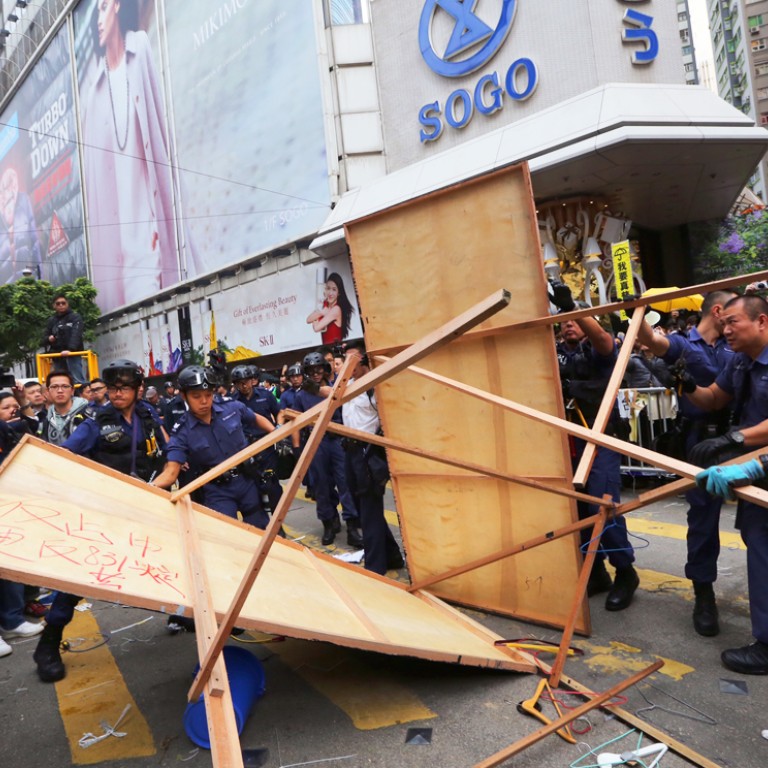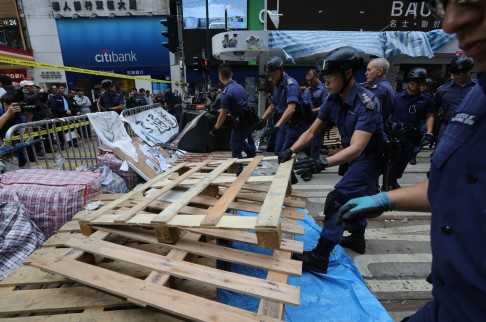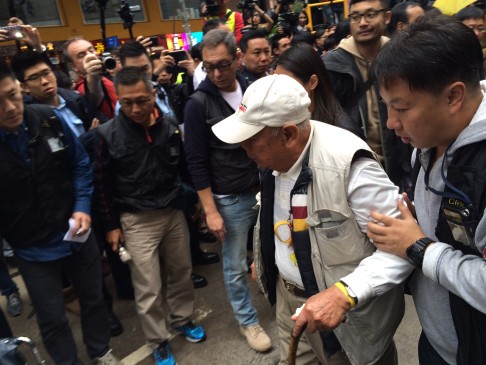
Update | ‘Occupy is over’: Hong Kong chief executive announces end to protests as Causeway Bay is cleared
Hong Kong’s leader declared an end to 78 days of mass protests by pro-democracy demonstrators after police today cleared the last major camp and arrested 20 peaceful protesters.
Hong Kong’s leader declared an end to 78 days of mass protests by pro-democracy demonstrators after police today cleared the last major camp and arrested 17 peaceful protesters.
“With the completion of the clearance work in the occupation site in Causeway Bay, the illegal occupation action that has lasted for more than two months in Hongkong is over," Chief Executive Leung Chun-ying said, adding that they had caused a “serious loss” to the local economy and damaged the rule of law.
“Now I think we should reflect on an important issue. That is, what is the kind of democracy that Hong Kong should pursue? I think it should be ‘democracy with the rule of law' that Hong Kong, as well as other advanced democracies, are pursuing,” said Leung, speaking to reporters after a ceremony of a local foundation.
“If we only talk about democracy, but not rule of law. It is not true democracy. It is only anarchy,” he added.
The last blow was when security guards cleared a small pro-democracy camp outside the Legislative Council that demonstrators had already retreated from.
A total of 955 people had been arrested as of today for offences relating to the Occupy protests.,police said on Monday night. Some 130 police officers were injured during the protests and 221 protesters received medical treatment through arrangements made by police.
Police received complaints from 1,972 members of the public, of which 106 have been classified as reportable complaints to be put under police watchdog's scrutiny. Most complaints involve neglect of duty and unnecessary use of authority.
Among the complainants, 137 are the aggrieved or directly-affected parties, while the rest police say are members of the public who made complaints after watching footage in the media or online. So far, 75 people have turned themselves in to the police.
By the 3pm clearance deadline, nearly all of the protesters' tents and belongings at the building's drop-off entrance for cars and the adjacent piazza had been packed up voluntarily. Just a flotsam of rubbish, boxes and plastic bags remained in front of the building.
Watch: Hong Kong police clear last major Occupy protest site; 17 arrested
About 10 protesters stayed briefly, but were keen to avoid possible arrest. A performance artist, Au Yeung Tung, who is also a member of the pro-democratic party ADLP, arrived and started shuffling in slow-motion to illustrate the "pace of democracy in Hong Kong over the years".
The last person to take a stand inside that specific area was 60-year-old retired teacher Fung Tak-wah, who refused to leave, and had to be picked up and carried out by security guards.
As workers quickly cleaned up the Legco site, a demonstrator started playing music, adopted by the Umbrella Movement, on a small speaker. The area was declared temporarily off-limits to all people except cleaners, who scraped posters stuck to the walls and swept up debris.
Others refused to give up the cause - the push for a free choice in the election - even if it meant protesting by their lonesome. Tai Kwai-heung, 61, pitched a tent on Tim Mei Avenue near the government headquarters, indignant that the demonstrators were shut out of Legco.
"I may not live for very long, but I'm worried for my children and grandchildren. That's why I'm here, and the same is true for other elderly protesters," Tai said.
Legislative Council President Jasper Tsang Yok-sing had announced the clearance after the majority of members in the Legco Commission, which oversees the legislature’s affairs, voted in favour of it during a four-hour meeting.

“The protesters said they are willing to make way for emergency vehicles, but the Legco’s secretariat told them it was not acceptable", as lawmakers’ access to the building’s main entrance was still blocked, he said.
“The public protest zone is supposed to be open for the public to protest [in]. Now the protesters’ occupation is in fact depriving others of the right to use the area … It posed threat to public hygiene and safety, and there were even people having hot pot [for dinner using a gas stove despite our] staff’s request for them to stop,” Tsang said.
After the protest zone and the square outside Legco are cleared, the area will be closed for about three weeks for cleaning and repairs, before being reopened possibly on January 7 in time for the first meeting of the year, Tsang said.

They collapsed tents and took down banners, with some officers scrambling on top of tram station roofs to do so. They also took away wooden pallets used as makeshift furniture or speakers' platforms during the protests.
At half past noon, officers arrested three people, including a man in his 90s known as "Grandpa Wong", who remained on Yee Wo Street. The other two were middle-aged.
Grandpa Wong, a well-known participant of the protests, had previously been arrested during the Admiralty camp's clearance last Thursday and on Chater Road on July 2. He refused offers of a wheelchair, preferring to walk with a cane as he was hauled away.

Five of the sit-in protesters, including Ian Chan, a Federation of Students member, were in Causeway Bay since the start of Occupy Central on September 28. Seven Occupy supporters who used to be based in Mong Kok, plus five others, were led away with the rest to a police vehicle.
By 1pm, the cleaning crews' trucks, which carried water to hose down the streets, were seen driving away. Faint chalk marks saying "I want true universal suffrage" were still visible on the pavement.

Highlighting the relatively relaxed pace of the operation, officers took a group photo at the end.
Normal traffic resumed after more than 70 days, with a policeman on a motorbike leading the first batch of cars through the eastbound lanes of Yee Wo Street.
The protest enclave had stretched from Hennessy Road, in the middle of a bustling shopping area, down to Yee Wo.

"Has this government ever listened to us?" the protester said, crying, after police issued another warning for them to leave.
Lawmaker Chan Ka-Lok, holding a yellow umbrella, told police to give up persuading the group to exit. "We will not leave! We want true democracy!"
Police spokesman Kong Man-keung had given protesters 30 minutes to leave the area before the clearance began. He warned that anyone who resisted, provoked the police or used violence would be met with "minimal, proportional force" and may be arrested.
Police set up two access control points in and out of the buildings and shops on Yee Wo Street, as well as a traffic control area stretching from Percival Street to Jardine's Bazaar and Sugar Street.

At least one person had to register that morning: a masked man clad in a black jacket who was frisked by police at around 11.30am after being spotted moving around the camp and standing on a chair.
When police asked what he was doing, he pointed to a GoPro camera mounted on the strap of his rucksack. He had a yellow ribbon - a symbol of the democracy movement - pinned on the other side of his jacket.

Civilians moving within the clearance site, with or without a camera, needed a press badge or else would be considered one of the protesters.
Unlike the clearance of camps in Mong Kok and Admiralty - the former marked by clashes between police and Occupy supporters and the latter slowed down by a sit-in held by a hundred people - the operation in Causeway Bay had been expected to be swift.
Ten minutes after a briefing, police officers mounted yellow stepladders as a makeshift stage from which to tell the protesters to leave.

"You are still allowed to leave the cordoned-off area at the Patterson Street exit after your personal information is recorded. You still have a choice," a police negotiator told the group, who said they would stay.
A smattering of protesters' tents outside the Legislative Council complex are expected to be cleared in the afternoon as well.
Independent Police Complaints Council members Eric Cheung Tat-Ming and Lau Man-man arrived this morning to monitor the proceedings.
Two other members of the police watchdog are also at the scene, Cheung said.

Protesters had already packed up many tents and supplies, saving some of the street art, but a few tents still stood this morning.
A woman had come early this morning and flashed protesters with a placard saying: “Thank you for your contribution."
However, Kelvin Yeung, 50, who works in a bank nearby, said he was glad to see the protesters go.

Tang Wai, in his 60s, who lives a few streets away, came down to watch the police operation. He said though it had inconvenienced commuters - including his grandson, who had to take a taxi to school each day - he agreed with the cause.
"They're fighting for the greater good, not for private gain. The government should have kept negotiating with them long ago so they didn't have to occupy this area for two months."
Tang said his friends in the neighbourhood, however, thought the protests were a nuisance. "Some of them said they had to keep their windows closed every night because of the protesters singing," Tang said.
He said some business owners he knew on Yee Wo Street had seen less foot traffic, but that they tolerated the protesters.

"I've never seen anything take such a toll on business," he said, adding it made the Sars outbreak in 2003 rosy by comparison. "At least we could sell disinfectants during the Sars outbreak."
"Gaining universal suffrage takes time. I'd rather they try to achieve their goal through legal and peaceful means," Ho said.
Student leaders have recently launched a "non-cooperation movement" as an offshoot to the protests, calling on Hongkongers to pay their taxes in small increments and to delay paying rent until the last possible minute, to show displeasure against the government.
With additional reporting from Agence France-Presse


